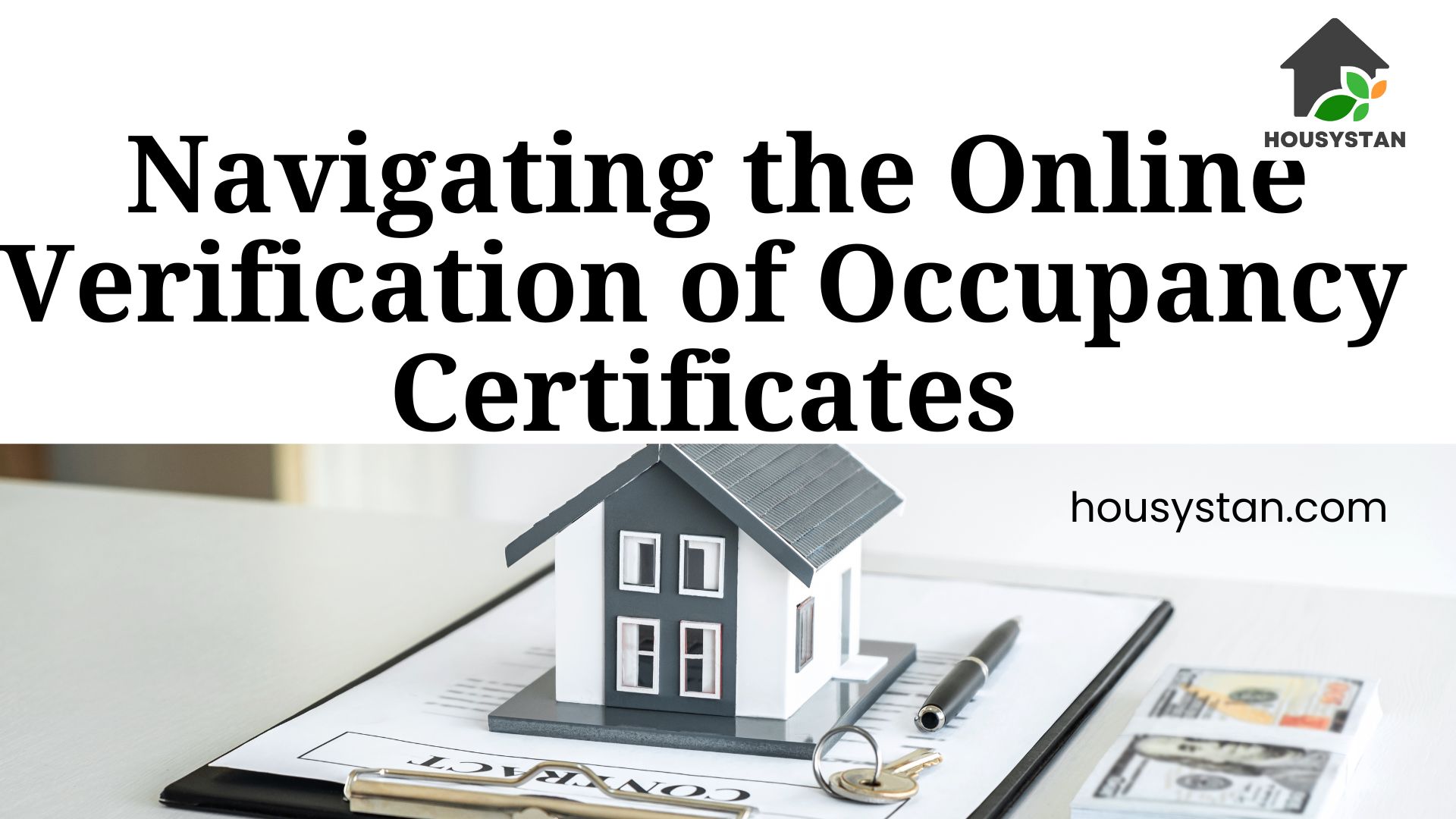Navigating the Online Verification of Occupancy Certificates
Read latest blogs and articles from Housystan

The Information mentioned here was last updated on:
29/1/2026Navigating the Online Verification of Occupancy Certificates
In recent years, digital advancements have revolutionized the way we manage crucial documents. One document that stands out in its significance is the Occupancy Certificate. Whether you're a homeowner, a real estate professional, or interested in property-related matters, understanding the online verification process for occupancy certificates is essential. Join us as we delve into the world of occupancy certificates, unraveling how digital methods are transforming their verification.
What is an Occupancy Certificate?
- Verified Tenants/Buyers
- Unlimited Property Listing
- Zero subscription/charges fee
An Occupancy Certificate, often referred to as an OC, is a vital document issued by local government authorities that signifies a building's compliance with building codes and regulations. It serves as an official statement that the building is safe and suitable for occupation. Without this certificate, numerous legal and financial complications can arise when purchasing, selling, or renting out properties.
Why is an Occupancy Certificate Important?
The importance of an occupancy certificate cannot be overstated. It ensures the safety and legality of your residence or any other type of property. Here's why this certificate is critical:
- Legal Standing: An occupancy certificate confirms that the building adheres to all safety standards, which is crucial in case of any legal inquiries.
- Financial Security: Without this certificate, banks are less likely to provide loans or mortgages for the property.
- Compliance Assurance: It acts as proof that the property has been built per the approved plan and local regulations.
The Traditional Way vs. The Online Approach
In the past, the verification process for occupancy certificates was burdened with bureaucracy, long queues, and paperwork. However, the advent of digital technology has paved the way for a simpler and more efficient system, allowing homeowners and stakeholders to verify these documents online.
How to Verify an Occupancy Certificate Online
Navigating the online verification of occupancy certificates involves a clear, step-by-step process. Here's a generic overview of how you can go about it:
Step 1: Visit the Official Website
Start by visiting the official website of your local building authority or municipal corporation. These websites usually have dedicated sections for property-related services.
Step 2: Locate the Verification Section
Search for the specific section related to occupancy certificate verifications. This section might be labeled under property services or similar headings.
Step 3: Enter Necessary Details
You will likely need to input property-specific details such as the property ID, owner's name, or the address. Ensure the information is accurate to avoid discrepancies during verification.
Step 4: Submit and View Results
After entering the required information, submit your request. The system will then process your entry, displaying whether the occupancy certificate is valid or not. Some platforms may also provide an option to download or print the certificate for your records.
Benefits of Online Verification
The shift to online verification of occupancy certificates offers numerous benefits, making it an appealing option for homeowners and property investors alike:
- Convenience: Verifying documents online eliminates the need to physically visit government offices, saving time and effort.
- Speed: The online process is typically faster, with results being available almost instantaneously.
- Transparency: Online systems often provide additional details, promoting transparency and trust among users.
Potential Challenges and How to Overcome Them
While online verification is undoubtedly advantageous, there may be hurdles to navigate. Here are common challenges and tips on overcoming them:
Limited Internet Access
Access to the internet might be a problem in some rural or underserved areas. Governments are increasingly working towards making digital services more accessible, but reaching out to local government centers equipped with online facilities or seeking assistance from someone with internet access can be initial workarounds.
Digital Literacy Issues
For individuals unfamiliar with digital platforms, the verification process can seem daunting. Providing community workshops or online tutorials can be beneficial. Alternatively, enlisting the help of tech-savvy friends or family members can ease the transition to digital processes.
Technical Glitches
Website maintenance, software updates, or server issues can temporarily hamper the online verification process. Regularly checking the official authorities' announcements or attempting the process slightly later can help mitigate these inconveniences.
Safeguarding Your Information
Online verification processes involve entering personal and property information. It's vital to ensure data safety and protect your privacy during this process:
- Use Official Websites: Always verify documents through official government sites to avoid scams or misinformation.
- Secure Networks: Conduct verifications using private, secure internet connections rather than public Wi-Fi, which may be less safe.
- Avoid Sharing Credentials: Keep your login information confidential, particularly if the site requires account creation for document verification.
The Resourceful Path Forward
Online verification of occupancy certificates is not just a fleeting trend; it's becoming the norm. As technology continues to evolve, accessing and verifying property documents will become more seamless, fully integrating into the fabric of modern real estate practices.
Staying Informed
As with any digital service, staying informed about updates in verification processes and requirements is crucial. Following official channels and government websites can keep you updated on any changes that could affect your property's documentation status.
Empowerment Through Digital Services
Taking advantage of digital tools to verify occupancy certificates equips property owners and stakeholders with greater control and understanding of their assets. Leveraging technology not only streamlines processes but also promotes informed decision-making, contributing to a more robust and secure housing market.
The combination of ease, efficiency, and enhanced accessibility marks a significant step forward in real estate management, paving the way for future innovations and improvements.